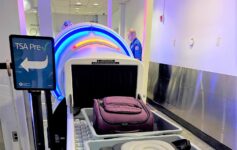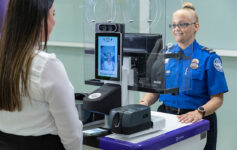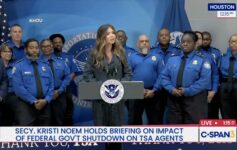New York Times columnist Ross Douthat argues that public reaction to the Transportation Security Administration is hopelessly rooted in partisan politics.
Imagine, for a moment, that George W. Bush had been president when the Transportation Security Administration decided to let Thanksgiving travelers choose between exposing their nether regions to a body scanner or enduring a private security massage. Democrats would have been outraged at yet another Bush-era assault on civil liberties. Liberal pundits would have outdone one another comparing the T.S.A. to this or that police state. (“In an outrage worthy of Enver Hoxha’s Albania …”) And Republicans would have leaped to the Bush administration’s defense, while accusing liberals of going soft on terrorism.
Bottom line, Douthat says, is that our ideological convictions may be real enough, but our deepest conviction is often that the other guys can’t be trusted.
That’s an interesting contention that merits discussion. While Douthat concedes that some liberals and conservatives have consistently supported the TSA while others have consistently attacked the agency, he latches on to an inconvenient truth that underpins Americans politics: we often fail to take the time to think critically.
But I’m not sure Douthat is asking the right question.
An examination of the genesis of the TSA reveals there was Congressional angst in creating a large new government agency in an area that had been traditionally handled by the private sector. Yet Americans overwhelmingly demanded that the government step in to "protect" them in the wake of 9/11 and the TSA was hastily created and enjoyed broad bipartisan support in its infant stages.
Problems at the TSA including inconsistent enforcement of agency protocol, employee rudeness, engaging in security theatre, stealing items in both carry-on and checked luggage, failure to detect bombs brought through security by undercover TSA agents, invasive screening procedures, sales of banned items confiscated from passengers, and even multiple reports of employees sleeping on the job prompted many to evaluate the sagacity of putting so much trust (and funding) into the TSA, but bipartisan (and broad public) support for the agency persists.
With fully body scanners and "enhanced" pat-downs being rolled out at airports across America, now more than ever is the time to determine whether the TSA is doing more harm than good. And even if it is doing good or at least trying to, is it worth the cost? Why should national security concerns be immune from cost/benefit analysis?
This is what the public should be asking. Instead, public polling reveals a familiar phenomenon:
In 2006, Gallup asked the public whether the government posed an “immediate threat” to Americans. Only 21 percent of Republicans agreed, versus 57 percent of Democrats. In 2010, they asked again. This time, 21 percent of Democrats said yes, compared with 66 percent of Republicans.
In other words, millions of liberals can live with indefinite detention for accused terrorists and intimate body scans for everyone else, so long as a Democrat is overseeing them. And millions of conservatives find wartime security measures vastly more frightening when they’re pushed by Janet “Big Sis” Napolitano (as the Drudge Report calls her) rather than a Republican like Tom Ridge.
But I think Douthat is looking at the wrong poll data. While I have been critical of the TSA for years, I credit the recent saturation of TSA coverage in the media to the Drudge Report, which has seized on this issue more to discredit the Obama administration than out of genuine concern for the general welfare of the citizenry. And while pundits and even some Congressional leaders like incoming House Transportation Security Chairman John Mica (R-FL) have attacked the TSA, a recent CBS News poll reveals that more than 80% of Americans support full body scanners and enhanced pat-downs.
That data directly contradicts Douthat’s contention we are a divided and hypocritical nation. It does, however, suggest (affirm in my mind) that we fail to think critically.
In our two-party system in America exacerbated by partisan news outlets and well-funded vitriolic propaganda from both sides, I suppose there will always be a modicum of distrust of the other side. But I still expect a little more from our leaders and from the American people. I’d like to know why Republicans who once vociferously supported the TSA are now deeply troubled by the agency. I’d like to know why Democrats and newspapers like the Los Angeles Times and Washington Post, who can otherwise be counted on to ardently champion civil liberties, have vocally labeled the obtrusiveness of the TSA as necessary to secure the homeland.
Even with a political science degree, I can’t figure out why politicians, with the exception of fringe figures like Ron Paul, are so afraid to ask tough questions rather than hiding behind the mantle of terrorism. Even more puzzling, I can’t figure out why more Americans don’t demand a clear and coherent narrative explaining why security concerns outweigh civil liberty concerns, no matter which party is in power.
Douthat ends on an optimistic note, concluding:
At the very least, the power of partisanship means that there will always be someone around, when Americans are standing spread-eagled and exposed in the glare of Rapiscan, to speak up and say “enough!”
Maybe that’s the best we can hope for in our political system, but I think if more of us critically examined the medical, civil liberties, effectiveness, and cost concerns of the TSA, we might find broad consensus that our airport security methodology is in urgent need of correction. And we’d probably find consensus in many other areas as well.
Surely, if we can all agree that Jennifer Grey deserved to win Dancing with the Stars we can agree that we shouldn’t continue to pour billions of tax dollars into technology that may not even keep us safer at enormous costs to our civil liberties…




Excellent post Matthew. The “politics of politics” is fascinating to watch, and although I lean a certain way (ok, probably more than just lean), I try to remain as objective as possible. Society always wants to blame one side or the other, and I have to agree with your point that our focus should instead be on a review of the TSA itself. Who would carry out such a review of the TSA and the powers endowed to it without getting the political machine that is America involved?
We’re so reactionary to threats, and too much of our focus and news reporting seems to be centered in preventing an identical attack, so were stuck with taking surveys and 80% of us apparently agree with TSA’s efforts. The geek in me wants to dissect that survey to find flaws, but that would be my only point to make me right and dwindle down that 80%. Whatever happens, I hope airport theatre doesn’t become just too ridiculous that I give up on it altogether.